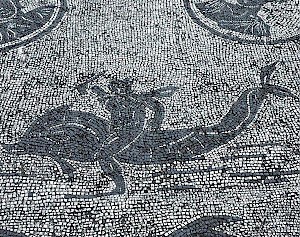Herodotus on Arion
Herodotus of Halicarnassus (fifth century BCE): Greek researcher and author, the world's first historian. In The Histories, he describes the expansion of the Achaemenid empire under its kings Cyrus the Great, Cambyses and Darius I the Great, culminating in king Xerxes' expedition in 480 BCE against the Greeks, which met with disaster in the naval engagement at Salamis and the battles at Plataea and Mycale. Herodotus' remarkable book also contains excellent ethnographic descriptions of the peoples that the Persians have conquered, fairy tales, gossip, and legends.

One of Herodotus' most famous short stories is about the musician Arion, who is believed to have been active in the last quarter of the seventh century BCE and lived at the court of Periander, who was tyrant of Corinth from 627 to 587.
Herodotus' statement that Arion was the inventor of the dithyramb (a hymn with a narrative in it, dedicated to the god Dionysus) is confirmed by other sources, although the poet Archilochus refers to a dithyramb in the early seventh century.
[1.24] In the age of Periander, the tyrant, say the Corinthians (and the Lesbians agree with them), there happened to him a very great marvel, namely that Arion of Methymna was carried ashore at Taenarum upon a dolphin's back. This man was a harper second to none of those who then lived, and the first, so far as we know, who composed a dithyramb, naming it so and teaching it to a chorus at Corinth.
This Arion, they say, who for the most part of his time stayed with Periander, sailed to Italy and Sicily, where he acquired large sums of money. After his tour, he wished to return to Corinth and he set forth from Tarentum. Because he had more faith in Corinthians than in other men, he hired a ship with a crew of Corinthians. However, when these were out in open sea, the story says, they formed a plot to cast Arion overboard and take his wealth. When he learned of this, he made entreaties to them, offered them his wealth and asked them to grant him his life.
However, he did not prevail upon them, and the men who were conveying him told him to either slay himself there and receive burial on the land, or leap straightway into the sea. So Arion, desperate, entreated them that, since they were so minded, they would allow him to take his stand in full singer's garb upon the deck of the ship and sing; and he promised to put himself to death after he had sung. They then, pleased that they should hear the best of all singers upon earth, drew back from the stern towards the middle of the ship; and he put on the full garb and took his lyre, and standing on the deck performed his most famous song. When the song ended, he threw himself into the sea just as he was, in his singer's garb.
They went on sailing away to Corinth, but a dolphin supported Arion on its back and - so they say - brought him to shore at Cape Taenarum. When he had come to land, he proceeded to Corinth with his singer's garb. After his arrival, he told all that had happened, but Periander, who doubted his story, kept him in guard and would let him go nowhere, while he kept careful watch for those who had conveyed him.
When they came, he called them and inquired if they had news about Arion. When they said that he was safe in Italy and that they had left him at Tarentum faring well, Arion suddenly appeared before them in the same guise as when he had made his leap from the ship. They were struck with amazement and no longer able to deny what they had done.
This is the tale told by the Corinthians and Lesbians, and there is at Taenarum a small votive offering of Arion, namely a bronze figure of a man upon a dolphin's back.